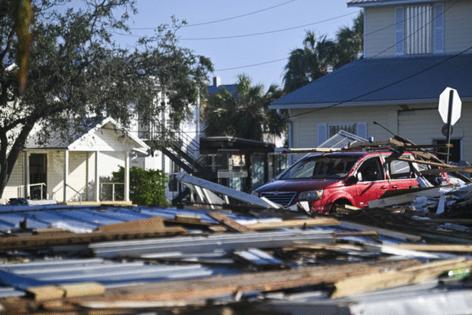Helene damaged your home or car? How to get in touch with your insurer, and other tips
Published in News & Features
Hurricane Helene caused extensive flooding up and down Florida’s Gulf coast and 140-mph winds when it barreled into the state’s Big Bend.
For thousands of Floridians, that means working with your insurance company. If you’re in that group, you should do one thing first: Contact your insurance company immediately.
Here’s how to do that — and what to expect:
Which insurer should I contact?
This depends on what kind of damage your property experienced.
If your home got flooded — and you have flood insurance — reach out to the National Flood Insurance Program or your private flood insurer.
For all other damage to your home, contact your homeowners insurance company.
The difference between flood policies and homeowners policies is a frequent source of confusion. A typical homeowners insurance policy does not cover flood damage, and carriers will refuse to cover any damage they believe was caused by flooding.
Most flood policies are through the federal National Flood Insurance Program, which is overseen by the Federal Emergency Management Agency.
Homes can experience both types of damage, such as if a tree falls through your roof and your home sees several inches of flooding. In those cases, contact both of your insurers.
When in doubt, call both.
To report any damage to your vehicle, contact your auto insurer.
How do I contact my insurer?
The easiest thing to do is call.
Here’s a complete list of Florida homeowners and automobile insurance companies and their contact information.
For the National Flood Insurance Program, call 877-336-2627.
Make sure you provide a reliable phone number and email address to be contacted. Provide your policy number if you have it.
The sooner you call, the sooner your claim could be addressed.
What do I do after I call?
After you call, your insurance company should send an adjuster to document and assess the damage. That could take a day or two (or more), depending on the company and the level of damage.
In the meantime, you should document the damage.
Before you start cleaning up, take photos and videos of the affected areas and of any items that were damaged. Make a list of those items. Record serial numbers, and hang on to receipts if you have them.
The National Flood Insurance Program has a page with instructions on how to document damage.
“The best way to combat a bureaucrat down the road is make sure you do the documentation in the first 24 hours,” Florida Division of Emergency Management Director Kevin Guthrie said Friday.
What if my insurance company isn’t responsive?
This is Florida, and there’s no shortage of stories of insurance companies low-balling homeowners or being slow to respond.
Ahead of Hurricane Helene, Florida regulators sent a warning to the industry that they could face fines if they don’t adhere to state laws and their own claims-handling policies.
Insurers are required to respond to a claim within seven days, according to state law. They then must make a determination on that claim within 60 days.
Review your insurance policies to know what to expect from your insurer. Some have different internal policies for how quickly they should respond to a claim.
If your insurer is not responsive, you can file a complaint with the state’s Division of Consumer Services. You can also contact the state’s insurance consumer advocate at (850) 413-5923 or YourFLVoice@MyFloridaCFO.com.
The state is also likely to host “insurance villages,” where policyholders, state officials and the insurers can meet to hash out disputes.
Licensed public adjusters can also sometimes help policyholders navigate their claim, usually for a percentage fee of the final settlement.
What’s the damage from Helene?
Officials are still assessing the situation, but storm surge appears to have caused serious flooding all along the state’s Gulf coast.
The storm also caused extensive wind damage in the rural counties of the state’s Big Bend.
Officials were concerned about homes in Tallahassee being crushed by falling trees and flying debris, but instead, the city appears relatively unscathed.
That’s thanks to the storm shifting east after appearing to take aim directly at the city.
“That would have been more damage in the capital,” Gov. Ron DeSantis said Friday.
What will Helene do to the insurance market?
Despite some headlines claiming that the storm will pose a major test for the state’s recovering homeowners insurance market, that isn’t expected to be the case.
Industry observers say that because the storm hit one of the least-populated parts of the state, the number of homeowners claims — and therefore, insurer losses — will be modest.
“This is not going to be a major test” of the industry, said Locke Burt, the CEO of Ormond Beach-based Security First Insurance Co. “It’s hitting in a place in Florida where very few people live.”
And much of the damage along the coastal areas appears to be from flooding, which mostly involves the federal government. Because homeowners insurance companies don’t cover flood damage, they’re largely unaffected by it.
_______
©2024 Miami Herald. Visit miamiherald.com. Distributed by Tribune Content Agency, LLC.







Comments